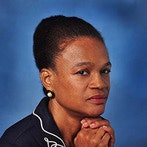In the early 2000s, the American Department of State and the United States Agency for International Development (USAID) were concerned with strategic funding for emerging nations. A focus was to enhance university and postsecondary education to promote national developments and foster careers for young people and emergent professionals. These groups would be positioned to further socioeconomic domestic conditions and to participate in multiple facets of diplomacy in geopolitical arenas. Dr. Beverly Lindsay
Dr. Beverly Lindsay
As the university-wide system International Dean at Penn State University, I attended a national meeting coordinated by the State Department and USAID to provide key information for American universities who would respond to a Request for Proposals. The RFP was to solicit top-quality proposals to help address the challenges facing the amalgamation of White, Black, Coloured, and Asian universities in South Africa – through cooperative relations with American universities. Numerous professionals crowded around Secretary Colin Powell, and I decided to stand aside and wait for the line to diminish around him. Surprisingly, Secretary Powell came over and warmly re-introduced himself to me. I was the only African American dean present from a top-tier research university. We chatted for three or four minutes, and I informed him that we planned to submit a proposal and would include an Historically Black College and University (HBCU). Fortunately, our proposal was funded for a multi-year grant that included the University of Pittsburgh and Lincoln University, an HBCU. Although the names of the other universities were not mentioned to Secretary Powell, he keenly noted that African Americans and other demographic groups would be involved in our proposal. He also encouraged me to expose and bring people of color into international affairs and education at Penn State and elsewhere – through study, research, and engagements on all continents.
A few years later, I had my first Fulbright Fellowship to South Korea. Upon my arrival and for several weeks thereafter, I was frequently asked, “Are you part of the advance team for Secretary Powell?” The Secretary was scheduled, later in autumn, for diplomatic engagements in South Korea. Constant statements from a variety of individuals and audiences expressed their esteem for the Secretary. On a personal level, I was quite contented to be viewed as a Black American professional, not always the reality in various milieus.
Fortunately, through professional organizations and non-public meetings, I had the opportunity to chat and interact periodically with Secretary Powell. In fall 2019, my last interaction occurred, that I will truly remember. In the public assembly, I queried him about what messages he would impart to young university students, about various forms of emerging technology He replied that he did not know much about Tik Tok, Instagram, and other platforms, that college students are enamored with and added that he would learn more from his grandchildren.
The most remarkable memories of my interactions with the Secretary were his constant articulations to encompass diversity and equity within international affairs and education. After the last public forum, a small group chatted with him afterwards. He gently chided me for using “university speak” when I queried him publicly. Nevertheless, he emphasized the essential importance of different types of students’ and professionals’ involvement in international affairs. (Likely, his Jamaican American heritage and the polyglots of his Bronx childhood and youth were early impetuses for his international perspectives). Boren, Fulbright, and other prestigious international fellowships, along with major grants from Federal agencies should be undertaken in multiple countries. Faculty of color and different demographic populations should be prepared and engaged in international affairs far beyond domestic borders. After all, there are critical linkages among domestic and international and geopolitical matters. The public will be the beneficiaries of cooperative relations via varied diplomatic endeavors entailing education, science, technology, culture, and economics. Secretary Powell’s wisdom and initiatives will be sorely missed at universities throughout the world.
Dr. Beverly Lindsay is the Co-Director and Principal Investigator of Women and University Leadership in Conflict, Post-Conflict, and Transitional Societies at the University of California and a member of the Council on Foreign Relations and Fellow of the Comparative and International Education Society.


















